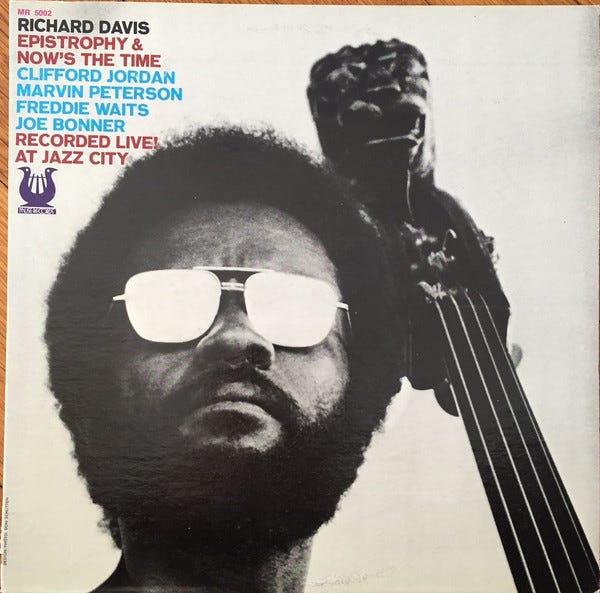A lot happened in a short period of time.
1944: Dizzy Gillespie and Coleman Hawkins record the first bebop, “Woody ‘n You” and a few other tunes, beginning the era of art for art’s sake in jazz
1954: Miles Davis records the first hardbop, “Walkin,’” where the interactive rhythm section swings as hard as a big band
1964: Eric Dolphy records Out to Lunch, a benchmark in high-modernism: jazz as esoteric chamber music
Some of this is simply the story of the bass. In the ‘40s the bassist seldom had the power to make much of a difference, especially on record. For Miles Davis in the ‘50’s, the bass mattered: Percy Heath to Paul Chambers to Ron Carter is an epic sequence. Eventually, only one bassist could have played on Dolphy’s mid-‘60’s Out to Lunch, Richard Davis.
Davis and Dolphy connected because they both loved avant-garde European music. Dolphy was into Varèse, while there’s a unprecedented press quote somewhere, “Richard Davis is Igor Stravinsky’s favorite bass player.”
Davis didn’t limit himself to avant-garde settings. He played with many conventional jazz groups including famous singers like Sarah Vaughan; there was also serious time in the studios, including the Astral Weeks session for Van Morrison that boasts one of the most prominent acoustic bass performances on any folk/rock record.
However, even when the setting was not avant-garde, Richard Davis kept some of that modernist perspective in the mix. The bass sticks out, interjecting layers of chaos and mystery. He was truly one of a kind.
All the Richard Davis obits will mention Out to Lunch and Astral Weeks. A few more:
Dolphy and Davis recorded four duos, including Ellington’s “Come Sunday” where Davis plays the melody arco, high on the instrument and in tune.
Andrew Hill’s Blue Note discography is unthinkable without Richard Davis. Those two were really peas in a pod!
Black Fire and Point of Departure are famous, but I have a soft spot for Pax with Freddie Hubbard, Joe Henderson, and Joe Chambers. On “Eris” they start with the blues form, but it goes lots of other places real quick. Davis seems to be the ringleader. Seize the day!
Davis’s own later bands as a leader would specialize in exactly this kind of thing, where a blues head or some other familiar melody was a gateway to high-energy madness and loosely-held forms. A classic example is “Now’s the Time” with Hannibal Marvin Peterson, Clifford Jordan, Joe Bonner, and Freddie Waits. There’s even chanting and wood flute in the middle of this 1972 live recording. Frankly, I don’t usually go for that Age of Aquarius kind of thing on a jazz record, but I dunno, on this occasion it is in its proper place.
After Davis moved to Wisconsin to teach, he would still come back to New York to play at Sweet Basil. Freddie Waits stayed by Davis’s side. Both Nasheet Waits and Eric McPherson told me about seeing those legendary gigs in the 80’s, often with people like Cecil Bridgewater, Ricky Ford, and Roland Hanna in the band. (Nasheet is Freddie Waits’s son and Eric is Richard Davis’s godson.)
Freddie Waits swings hard, of course, but he also can do whatever it takes to keep the music in the correct flow.
One of the most amusing anecdotes from the DTM interviews is with Mickey Roker, who told me:
I had a gig one time with Andrew Hill and Richard Davis. We played a house party someplace. I fit like two left shoes cause them muthafuckers were out to lunch and I am talking about (sings a swinging cymbal beat). So Richard turns around and says, “You’re swinging too much!” (Laughter) That’s the first time someone told me that I was swinging too much. I didn’t know what to do. I just started sweating and trying to figure out something crazy to play.
Two of the biggest swingers, Elvin Jones and Mel Lewis, loved playing with Richard Davis and repeatedly hired him for gigs and records. “This Love of Mine” has Elvin and Davis in trio with comparatively straight forward bebop master Charlie Mariano on alto. (I just love the Van Gelder sonics on Dear John C.)
For something with Mel Lewis, how about the big bad groove of Presenting Joe Williams? (Ben Street told me about this record.) I believe Davis is reading a complex part on “How Sweet It Is,” but Davis imbues that notey part with his own kind of raw perspective.
Richard Davis was on a lot of swinging records, but the experimental side of his legacy is unique. It was burning in his own way.
The rhythm section of Jaki Byard, Richard Davis, and Alan Dawson stared into the conflagration and saw something others did not, for example on Booker Ervin’s “A Lunar Tune.”
Hall Overton even wrote Davis an important 7-minute “concerto” for full orchestra and bass obligato, Sonorities.
Eric Dolphy, Andrew Hill, Elvin Jones, Mel Lewis, and so many others: They all understood that the room became much larger when Richard Davis unpacked his instrument.
Bonus tracks:
I write in detail about another fav Davis album, The Jaki Byard Experience, in my Byard centennial post.
I discovered the Hall Overton piece Sonorities while researching the complete Overton on record.
Today is the Wilbur Ware centennial, I will try to put up a little something for Ware later.




Well, you got me to go back and re-listen to a weird one-off album I have "Heavy Sounds" (1967) with Richard Davis and Elvin Jones headlining. Includes a tune with Elvin on guitar, "Elvin's Guitar Blues"!
Richard Davis is on half my favorite '60s albums, and the other half is Ron Carter!
Speaking of the Age of Aquarius: please check out this 1969 Andrew Hill joint:
https://www.youtube.com/watch?v=Lt7fZlwdouQ
Now tell me something about that!
Amiri